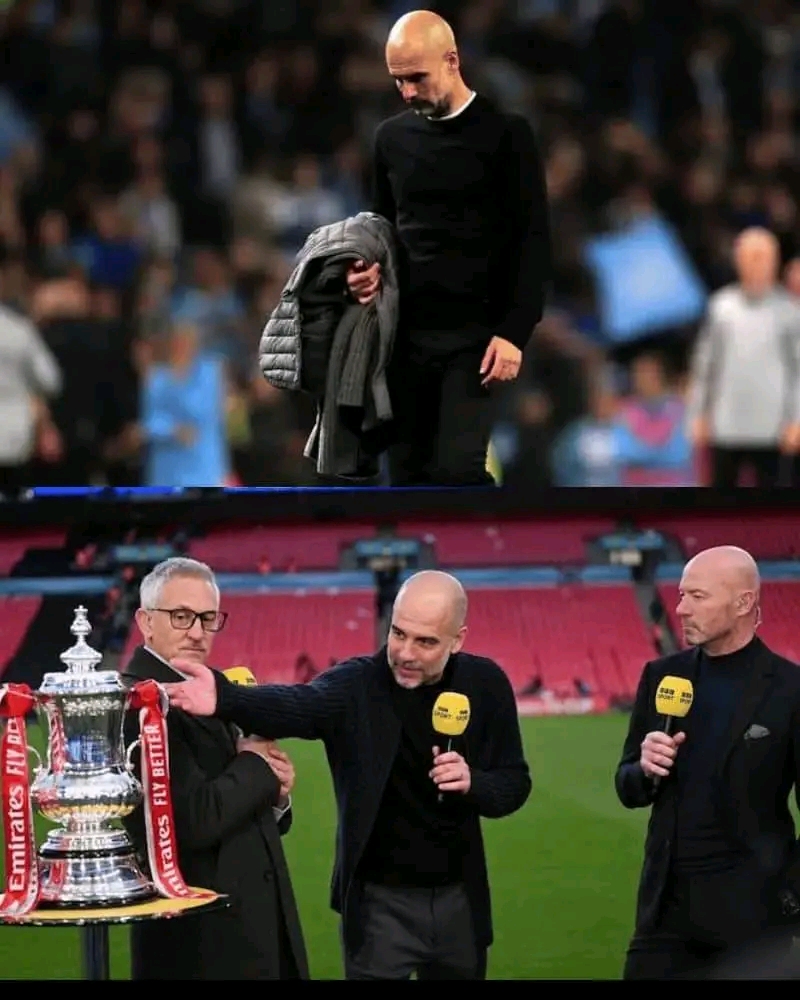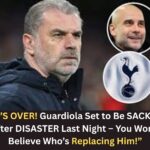Pep said other clubs could have sacked him

In the pantheon of modern football management, few figures command the respect and admiration that Pep Guardiola has earned throughout his illustrious career. The Catalan mastermind, whose tactical innovations have revolutionized the beautiful game, found himself in an unfamiliar position during the 2024-25 season – publicly acknowledging that his job security at Manchester City would have been in jeopardy at any other club following their unprecedented struggles.
As Manchester City prepare to face their cross-town rivals Manchester United at Old Trafford this Sunday, the context surrounding this fixture carries far more weight than the usual Manchester derby drama. This encounter represents more than local bragging rights; it symbolizes City’s desperate fight to secure Champions League qualification for next season and maintain their status among European football’s elite.
Guardiola’s candid admission to Sky Sports revealed the depth of vulnerability that even the most successful managers can experience. “In other clubs, without the recent success, I would have been sacked, definitely,” he stated with characteristic honesty. This statement, coming from a manager who has delivered four consecutive Premier League titles to the Etihad Stadium, underscores the severity of City’s mid-season crisis and the unique position Guardiola occupies within the club’s hierarchy.
The numbers tell a story that few could have predicted when the season began. Manchester City, the defending Premier League champions and a team that had seemingly perfected the art of winning, endured a catastrophic run of form that saw them secure just one victory in 13 matches across all competitions during November and December. This unprecedented collapse left the Sky Blues languishing in seventh place on Boxing Day – a position so alien to City supporters that it seemed almost surreal.
The statistics paint a picture of a team that had lost its way completely. During this torrid period, City’s usual free-flowing attacking football ground to a halt, their defensive solidity crumbled, and the midfield engine that had powered them to previous glory spluttered and stalled. The psychological impact of this decline was evident not just in results but in performances that lacked the intensity, precision, and confidence that had become synonymous with Guardiola’s City.
This dramatic fall from grace was particularly shocking given the context of their recent success. The club that had won four consecutive Premier League titles, conquered Europe, and established themselves as the benchmark for excellence in English football suddenly found themselves fighting for respectability rather than trophies. The transformation was so complete and unexpected that it left fans, pundits, and even Guardiola himself searching for explanations.
While Guardiola is known for his meticulous preparation and tactical adaptability, even the most brilliant managers can be undone by circumstances beyond their control. The injury crisis that befell Manchester City during the early part of the season proved to be the catalyst for their dramatic decline, exposing the fine margins that separate success from failure at the highest level of football.
The most significant blow came with the season-ending anterior cruciate ligament injury suffered by Rodri, City’s Spanish midfielder who had become integral to their playing style. Rodri’s absence cannot be overstated – he was the metronome around which City’s entire system revolved, the player who dictated tempo, provided defensive stability, and linked defense with attack. His injury left a void that proved impossible to fill adequately, disrupting the delicate balance that Guardiola had spent years perfecting.
“One of the main reasons has been the absence of many injured players in important departments so we were competing in the toughest period with only 12 to 13 senior players in the team,” Guardiola explained. This shortage of available personnel forced the manager to constantly rotate his squad, preventing the development of rhythm and understanding that is crucial to his possession-based philosophy.
The injury list extended far beyond Rodri, affecting key players across multiple positions. This domino effect meant that Guardiola was often forced to field makeshift lineups, playing players out of position and disrupting the tactical cohesion that had been the foundation of City’s success. Every three days brought new selection headaches, with the manager unable to establish a settled team or maintain the tactical consistency that his system demands.
Throughout his career, Guardiola has been lauded for his tactical innovations, man-management skills, and ability to extract the maximum potential from his players. However, the 2024-25 season forced him to confront his own limitations and question methods that had previously brought him unprecedented success.
“This season I was not able to help the team to do it. I was not able to find the right trick,” Guardiola admitted with characteristic honesty. This statement reveals a vulnerability rarely seen from one of football’s most confident and successful managers. For someone who has built his reputation on finding solutions to complex tactical problems, the admission that he couldn’t unlock the code to his team’s struggles represents a profound moment of self-awareness.
The Catalan’s reflection on his inability to guide his team through this crisis period demonstrates the immense pressure and responsibility that elite managers carry. “In the past I was able to guide them, to tell guys, ‘this is the path you have to do to survive in that moment’, because the good moments will come. The sun rises in the future. We were not able to do it,” he continued, revealing the psychological toll that failure can take even on the most accomplished individuals.
This period of introspection has arguably made Guardiola a more complete manager. The experience of navigating through genuine adversity, rather than the minor setbacks that most successful managers face, has provided him with new perspectives and potentially new tools for future challenges. The humility displayed in his public statements suggests a manager who has grown from this experience, even as he has suffered through it.
One of the most intriguing aspects of Guardiola’s reflection on the season has been his acknowledgment that both success and failure can be unpredictable, even for those at the pinnacle of their profession. His admission that the level of success City had achieved in previous seasons had surprised him provides insight into the mindset of a manager who, despite his confidence, remains grounded in the realities of football’s uncertainties.
“I said many times and I’m incredibly honest – the success that we had in the past, that surprised me because I wasn’t expecting it,” Guardiola revealed. This statement is remarkable coming from a manager whose teams have won numerous titles across different countries and competitions. It suggests that even at the highest level, the margin between success and failure is often narrower than it appears from the outside.
The flip side of this acknowledgment is equally revealing. While Guardiola had anticipated some decline in form after four consecutive title wins – a natural expectation given the physical and mental demands of sustained excellence – the depth of City’s struggles caught him off guard. “What happened this season, when in the last one or two seasons more or less, I said it’s going to happen. But I didn’t expect maybe so deep,” he explained.
This honest assessment provides valuable insight into the cyclical nature of football success and the challenges of maintaining excellence over extended periods. Even the most successful teams and managers must eventually face periods of transition and struggle, and Guardiola’s experience serves as a reminder that no one is immune to football’s inevitable ups and downs.
The Manchester derby that took place at the Etihad Stadium in December serves as a perfect microcosm of City’s struggles throughout the season. Going into that match, Guardiola had publicly stated that his job would be under threat if the team didn’t start winning again soon – a remarkable admission from a manager of his stature and success.
The match itself unfolded in a manner that seemed to encapsulate all of City’s problems. Despite taking the lead, they were unable to maintain their advantage, eventually losing 2-1 to a United side that, while improved, was hardly at their peak. The late collapse in that derby highlighted the fragility that had crept into City’s game, the lack of mental resilience that had previously been one of their greatest strengths.
For Guardiola, this defeat represented more than just another loss in a disappointing run. It crystallized the reality of his situation and forced him to confront the possibility that even his previously unassailable position might be under threat. The fact that he had publicly linked his job security to the team’s performance added an extra layer of pressure to an already difficult situation.
One of the most significant factors in Guardiola’s survival during this crisis period has been the unwavering support of Manchester City’s hierarchy. In an era where managerial changes are often swift and ruthless, particularly at elite clubs, City’s decision to back their manager through this difficult period represents a masterclass in institutional thinking and long-term planning.
The decision to offer Guardiola a new two-year contract in November, right in the midst of the team’s struggles, sent a clear message about the club’s faith in their manager’s ability to turn things around. This vote of confidence was not just about recognizing past achievements but about maintaining belief in the systems and processes that had brought previous success.
“But also I think all of us, the staff, myself, we deserve a chance, after what we had in the past,” Guardiola reflected. This statement acknowledges the bank of goodwill that he and his team had built up through their previous achievements, while also recognizing that such capital is not infinite and must be repaid with improved performances.
The support from the board has been crucial in allowing Guardiola to maintain his long-term perspective and continue implementing his methods even when short-term results were disappointing. This institutional patience is rare in modern football and speaks to City’s maturity as an organization and their understanding of the cyclical nature of football success.
As the season has progressed, there have been signs that Manchester City are beginning to rediscover the form that made them so dominant in previous campaigns. Recent victories against Bournemouth in the FA Cup and Leicester City in the Premier League have provided glimpses of the team that won four consecutive titles, offering hope that the worst of their struggles may be behind them.
“In the last two games, I saw something that I like,” Guardiola noted with cautious optimism. “I remember a few things that we saw in the past. And this is what we have to build from there.” These words suggest that the manager has identified the elements that need to be restored to return his team to their previous level of performance.
The key to City’s recovery appears to lie in rebuilding the confidence and rhythm that were disrupted during their difficult period. Football is as much a mental game as a physical one, and the psychological scars left by extended periods of poor results can take time to heal. However, the quality within the squad remains evident, and with Guardiola’s tactical acumen still intact, there is every reason to believe that City can return to their best.
While Manchester City’s current season may not deliver the silverware that fans have become accustomed to, the immediate focus remains on securing Champions League qualification for next season. Currently sitting in fifth place, City are in a position that would ordinarily guarantee participation in Europe’s premier competition, but the margin for error remains small.
The importance of Champions League qualification extends far beyond the immediate sporting considerations. For a club of City’s stature and ambitions, regular participation in the Champions League is essential for maintaining their status among the world’s elite clubs. It affects everything from player recruitment to commercial revenue, making it a crucial objective for the remainder of the season.
“Of course, it’s in our hands. We have eight games. So, we’re going to go for it,” Guardiola stated with determination. This acknowledgment of the situation’s urgency while maintaining confidence in the team’s ability to secure the necessary results demonstrates the manager’s pragmatic approach to the challenges ahead.
Throughout this difficult period, Guardiola has maintained a philosophical perspective on the nature of success and failure in football. His acknowledgment that “you cannot win all the time because it’s simply impossible” reflects a mature understanding of the sport’s inherent uncertainties and the cyclical nature of success.
This philosophical approach has been crucial in helping him maintain perspective during the darkest moments of the season. Rather than allowing the disappointment to overwhelm him, Guardiola has used this period as an opportunity for growth and learning, both for himself and his players.
The experience of genuine adversity can be invaluable for any manager, providing lessons that cannot be learned during periods of uninterrupted success. For Guardiola, this season has offered a masterclass in resilience, adaptability, and the importance of maintaining belief even when results suggest otherwise.
As Manchester City prepare for the final stretch of the season and look ahead to future campaigns, the lessons learned during this challenging period will undoubtedly prove valuable. The experience of navigating through genuine crisis has provided Guardiola and his team with new insights and a deeper understanding of what it takes to maintain excellence over extended periods.
The manager’s commitment to staying at the club for at least two more years, despite the current struggles, demonstrates his belief in the long-term project and his determination to restore City to their previous heights. This continuity will be crucial in ensuring that the lessons learned during this difficult period are properly applied and that the foundations for future success are properly laid.
“Hopefully, next season will not happen like this season. Of course, we have to change things, definitely. But next season will be better,” Guardiola concluded with characteristic optimism. This statement encapsulates the forward-thinking approach that has defined his career and suggests that he views this season’s struggles as a temporary setback rather than a permanent decline.
The 2024-25 season will likely be remembered as one of the most challenging periods in Pep Guardiola’s managerial career, but it may also prove to be one of the most instructive. The way in which he has handled adversity, maintained his principles, and continued to search for solutions demonstrates the qualities that separate truly great managers from merely successful ones.
The honest self-reflection, the acknowledgment of his own limitations, and the philosophical approach to both success and failure reveal a manager who has grown through adversity. While the immediate results may not have met expectations, the long-term impact of this experience on both Guardiola and Manchester City could prove to be profoundly positive.
As City prepare to face Manchester United in this crucial derby, they do so not just as a team fighting for Champions League qualification, but as a group that has been tested by adversity and emerged with a deeper understanding of what it takes to succeed at the highest level. The true measure of their response to this crisis will be determined not just by the results in the remaining games of this season, but by how they use these lessons to build an even stronger foundation for future success.
In the grand narrative of Pep Guardiola’s career, this season may well be remembered as the chapter that transformed a great manager into a complete one, providing him with the full spectrum of experiences necessary to guide teams through any situation. The admission that other clubs would have sacked him reveals not weakness, but the self-awareness and humility that characterize truly exceptional leaders in any field.















